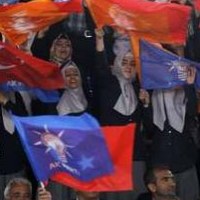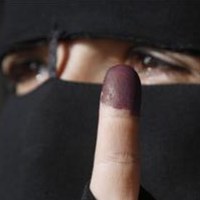![]()
Sun, May 22, 2011 | Rubin Reports | By Barry Rubin

An elderly Bahraini man walks past a wall spray painted with political graffiti and painted over again many times Sunday, May 22, 2011, in the western Shiite Muslim village of Malkiya, Bahrain. (AP Photo/Hasan Jamali)
Arab Spring: What Does It Really Mean?
There are 20 Muslim-majority political entities in the Middle East — counting the Gaza Strip and West Bank separately.
In 2 of these — Tunisia and Egypt — there has been political change, though the outcome is far from certain. As of now, both are basically ruled by the military. The revolutions succeeded in large part because of support from the armed forces. In Egypt, the parliamentary elections are certain to produce a majority of Islamists, Marxists, and radical nationalists.
In 2 more — Libya and Yemen — change is pending. In Libya, though, the dictator is basically winning the civil war despite Western intervention on the other side. In Yemen, even if the dictator leaves it is generally recognized that nothing will change.
There have been no major pro-democracy or even anti-regime demonstrations in the Gaza Strip, the West Bank, Morocco, Algeria, Sudan, Iraq, Jordan, Qatar, Kuwait, Lebanon, Saudi Arabia, Oman, and the United Arab Emirates.
In Bahrain, the demonstrations have been put down. In Syria and Iran, though there are still demonstrations, they have been heavily repressed. Nothing is going to change in Iran and probably not in Syria.
This is not to deny that there have been important developments, yet is this as much of an earthquake as many seem to think? Is this so clearly a transition to democracy?
It might be the beginning of a long-term process that will last for decades.
“Not every country will follow our particular form of representative democracy, and there will be times when our short-term interests don’t align perfectly with our long-term vision for the region.”
President Barack Obama, May 19, 2011
Everyone should be parsing that sentence which is a model of suicidally wishful thinking.
Yeah, they might not be perfect democracies and they might cause us a little trouble for a short time but everything’s going to be great! Nothing can possibly go wrong except, of course, if repression stops these wonderful transitions.
Remember, when a president refuses to look at what can — and will — go wrong and at what the threats are — if only to combat them more effectively — his country is in very serious trouble. And so are its friends.
About the author,
Barry Rubin is director of the Global Research in International Affairs (GLORIA) Center, editor of the Middle East Review of International Affairs (MERIA) Journal, and a featured columnist at PajamasMedia http://pajamasmedia.com/barryrubin/ His latest books are The Israel-Arab Reader (seventh edition), The Long War for Freedom: The Arab Struggle for Democracy in the Middle East (Wiley), and The Truth About Syria (Palgrave-Macmillan). The website of the GLORIA Center is http://www.gloria-center.org. His PajamaMedia columns are mirrored and other articles available at http://www.rubinreports.blogspot.com/.



 RSS
RSS




















#Arab Spring: What Does It Really Mean? | #democracy #revolution http://j.mp/kpffFz
#Arab Spring: What Does It Really Mean? | #democracy #revolution http://j.mp/kpffFz
By using the word SPRING for the Arab Movement,do we mean it is an Arab Uprising,actually jumping in the air with some political force,a physical jumping or it is Spring,Arab Spring,like the season before Summer…?? I am actually interested in the choice of the word. Is it a verb.or a noun to describe what is happening in the Arab world today!! I am interested in it grammatically.Thank you.